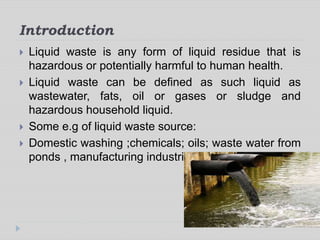The Of Reclaim Waste
The Of Reclaim Waste
Blog Article
The 10-Second Trick For Reclaim Waste
Table of ContentsThe Ultimate Guide To Reclaim WasteThe Of Reclaim WasteSome Ideas on Reclaim Waste You Should KnowThings about Reclaim WasteLittle Known Facts About Reclaim Waste.
Explore the kinds, occurrences, and types of liquid waste. Domestic sewer waste refers to the waste and items from a residential sewage-disposal tank. This sort of waste is produced by humans in houses, colleges, and various other structures. This only consists of septic systems that have a drainpipe area. The proper monitoring and disposal of domestic sewage waste call for fluid waste to be transferred to a sewer treatment plant where the proper methods and equipment are related to cleanse and get rid of waste.
Commercial waste frequently consists of possible risks, such as combustible materials or a combination of fluid and strong waste products, and needs a more sophisticated and thorough disposal procedure. The disposal of industrial waste commonly includes the filtering of waste prior to transportation to make sure safe and appropriate disposal. Industrial waste is created from results and runoff of commercial procedures and production.
This type of waste can not use the exact same sewage administration transportation or procedures as septic or business fluids. The hazardous waste administration process calls for the inspection and screening of liquid waste prior to it undergoes the disposal process (industrial wastewater treatment). Drainage waste is the fluid waste that comes from runoff and excess stormwater in extremely booming locations or cities
Drainage waste can cause contamination and flooding if not taken care of properly. Making certain proper waste management can stop catastrophes and lower environmental damage.
Reclaim Waste - Questions
Contact PROS Services today to find out about our waste monitoring and disposal services and the appropriate means to care for the fluid waste you generate.
(https://businesslistingplus.com/profile/reclaimwaste1/)This so-called 'wastewater' is not just a vital source yet, after therapy, will certainly be released to our land, waterways or the sea. Made use of water from bathrooms, showers, baths, cooking area sinks, laundries and industrial procedures is understood as wastewater.

water made use of to cool down equipment or tidy plant and tools). Stormwater, a kind of wastewater, is overflow that streams from agricultural and city locations such as roofings, parks, gardens, roadways, courses and seamless gutters right into stormwater drains pipes, after rain. Stormwater streams unattended directly to regional creeks or rivers, at some point reaching the sea.
Unknown Facts About Reclaim Waste
In Queensland, many wastewater is treated at sewage treatment plants. Wastewater is delivered from residential or commercial sites via a system of sewers and pump stations, referred to as sewerage reticulation, to a sewer treatment plant. Regional governments build, maintain and run most sewer therapy plants. Operators are accredited under the Environmental Management Act 1994 to release cured wastewater at an acceptable ecological requirement into waterways.
The Department of Natural Resources suggests city governments regarding managing, operating and maintaining sewerage systems and treatment plants. In unsewered locations, regional governments might require householders to install individual or home sewer treatment systems to deal with residential wastewater from commodes, kitchen areas, shower rooms and washings. The Department of Natural Resources authorises making use of family systems when they are proven to be reliable.
In some new neighborhoods, therapy of some stormwater to eliminate clutter, sand and crushed rock has started making use of gross anchor contaminant catches. Wastewater therapy occurs in four stages: Gets rid of solid issue.
Wastewater then streams right into large tanks where solids resolve and are removed as sludge. Grease and residue are skimmed from the surface area. Makes use of tiny living organisms referred to as micro-organisms to damage down and get rid of continuing to be dissolved wastes and fine particles. Micro-organisms and wastes are included in the sludge. Eliminates nitrogen and phosphorus nutrients that can cause algal blooms in our rivers and threaten marine life.
Not known Facts About Reclaim Waste
Nutrient removal is not offered in all sewer therapy plants since it needs pricey specialised devices. It is ending up being much more common in Queensland. Clear fluid effluent created after therapy may still consist of disease-causing micro-organisms. If this effluent is released right into waterways such as rivers or the sea, the micro-organisms will ultimately die out.

Many wastewater streams right into the sewerage system. Under the Act, regional governments administer approvals and permits for eco relevant tasks (Ages) including wastewater launches that might have a local impact.
Everything about Reclaim Waste
Surveillance provides valid information about water high quality and can verify that permit conditions are being met. The details gotten through monitoring supplies the basis for making water high quality choices.
Report this page